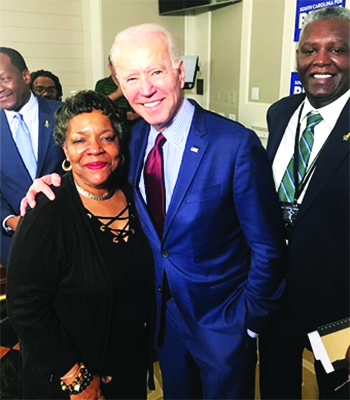
By Stacy M. Brown, NNPA Newswire Senior National Correspondent
With his campaign flailing, then-presidential candidate Joe Biden knew his fate hinged on African Americans.
Like many successful campaigns, political and otherwise, Biden looked to the Trusted Voice of Black America during what had become a critical, if not grave, moment of reckoning. On a brisk morning, Feb. 26, 2020, Biden received an essential reminder of the historical significance of the Black Press and how its backing could sway the all-important Black electorate.
However, just one year before the critical 2024 presidential election, where he’ll likely face a rematch with Donald Trump, the question arises: has the President forgotten the rhythm that drew him to the dance?
On that crisp February morning in 2020, a chartered bus rolled into historic downtown Charleston, carrying over a dozen Black Press publishers and leaders. The Mills House Wyndham Grand Hotel on Meeting Street hosted a critical gathering between Biden, his team, and the stalwarts of the Black Press. The stakes were high, and South Carolina held the key to the fate of Biden who trailed badly in the polls as rumors began to fly that he contemplated suspending his campaign.
The strategy was simple: connect with the “Trusted Voice of Black America,” a legacy that spans nearly two centuries when Samuel Cornish and John B. Russwurm boldly proclaimed, “We wish to plead our own cause,” and started the Black Press in New York.
The boldness of Russwurm and Cornish’s statement lies in the fact that they started Freedom’s Journal with those daring words before slavery ended. From Dr. Martin Luther King Jr. to Mamie Till, the Black Press has been the conduit for crucial messages that have reverberated globally.
Biden’s interview with NNPA President and CEO Dr. Benjamin F. Chavis Jr. broadcast over the expansive social media channels of the Black Press, became a lifeline for his campaign. His words could now reach over 30 million people, particularly African Americans. A subsequent national feature article about the get together ran in many of the more than 230 Black-owned newspapers and amplified Biden’s message to the African American electorate.
“The Black vote will determine the nominee… and hopefully the next president and The Black Press is the heart and soul as to why I got involved,” Biden acknowledged during the interview, recognizing the pivotal role played by African American voters.
His promises were explicit, and a breath of fresh air in comparison to Trump:
• Addressing housing discrimination
• Investing $640 billion over a decade for affordable housing
• Dismantling redlining
• Creating opportunities for first-time homebuyers
Those commitments voiced through the Black Press resonated with the Black community, a critical demographic that would propel Biden to victory. And it certainly didn’t hurt Biden that shortly after his sit down with the Black Press, and after he promised to appoint the first Black woman to the U.S. Supreme Court, the kingmaker, South Carolina Democratic Rep. James Clyburn, formally endorsed him.
Today, Biden’s dance seems to have lost its rhythm. Despite numerous policies benefiting African Americans, his messaging remains non-existent. With the 2024 election looming, polls indicating major declines in Black support, Biden’s campaign has ignored, as Biden once said, “What brought me to the dance,” the Black Press.
The recent Biden-Harris ad campaign, “History,” showcases the administration’s investments in rural Black communities. While commendable, it raises questions about excluding Black-owned media in those advertising buys. Biden’s campaign boasted a 16-week, $25 million ad buy targeting Black voters, yet the Black Press, with its unmatched influence and historical significance, is conspicuously absent.
As most understand, and the Biden campaign apparently does not, there’s a massive difference between Black-targeted and Black-owned. While to the campaign’s credit, they are running an ad with Byron Allen’s TheGRIO, a Black-owned entity, they haven’t done so with the Black Press — despite televised promises from various individuals in the Biden camp, including DNC Chair Jaime Harrison.
That’s also despite the ever-dwindling support of the Black electorate.
As the President gears up for a potential rematch against Trump, the question lingers: has Biden forgotten the rhythm that brought him to the dance, a rhythm inscribed in the ink of the Black Press? Only time will tell if the President can return to the beat that secured his place in the Oval Office.


